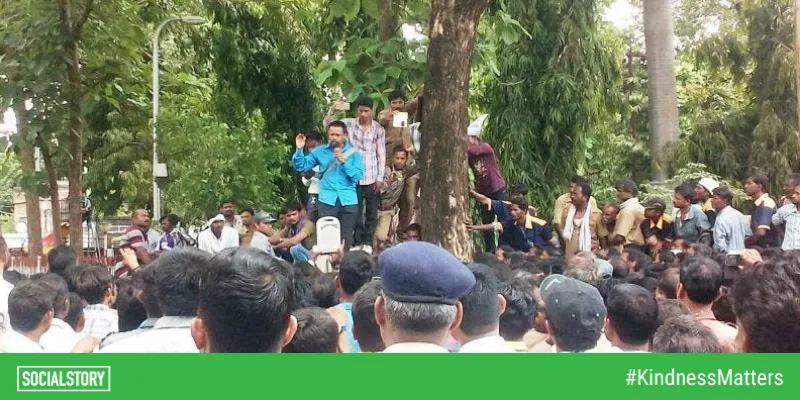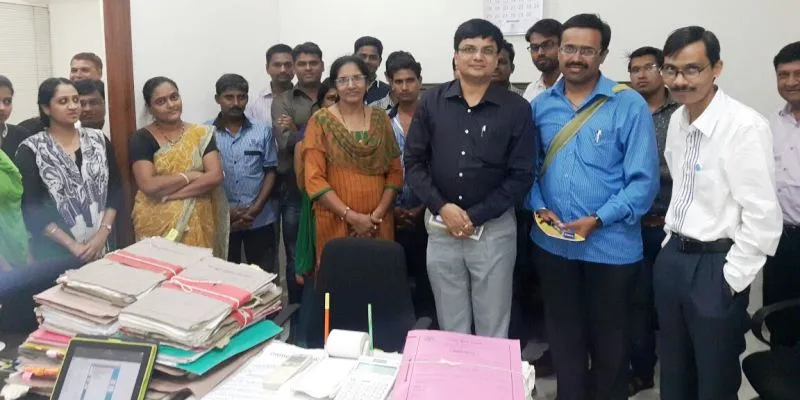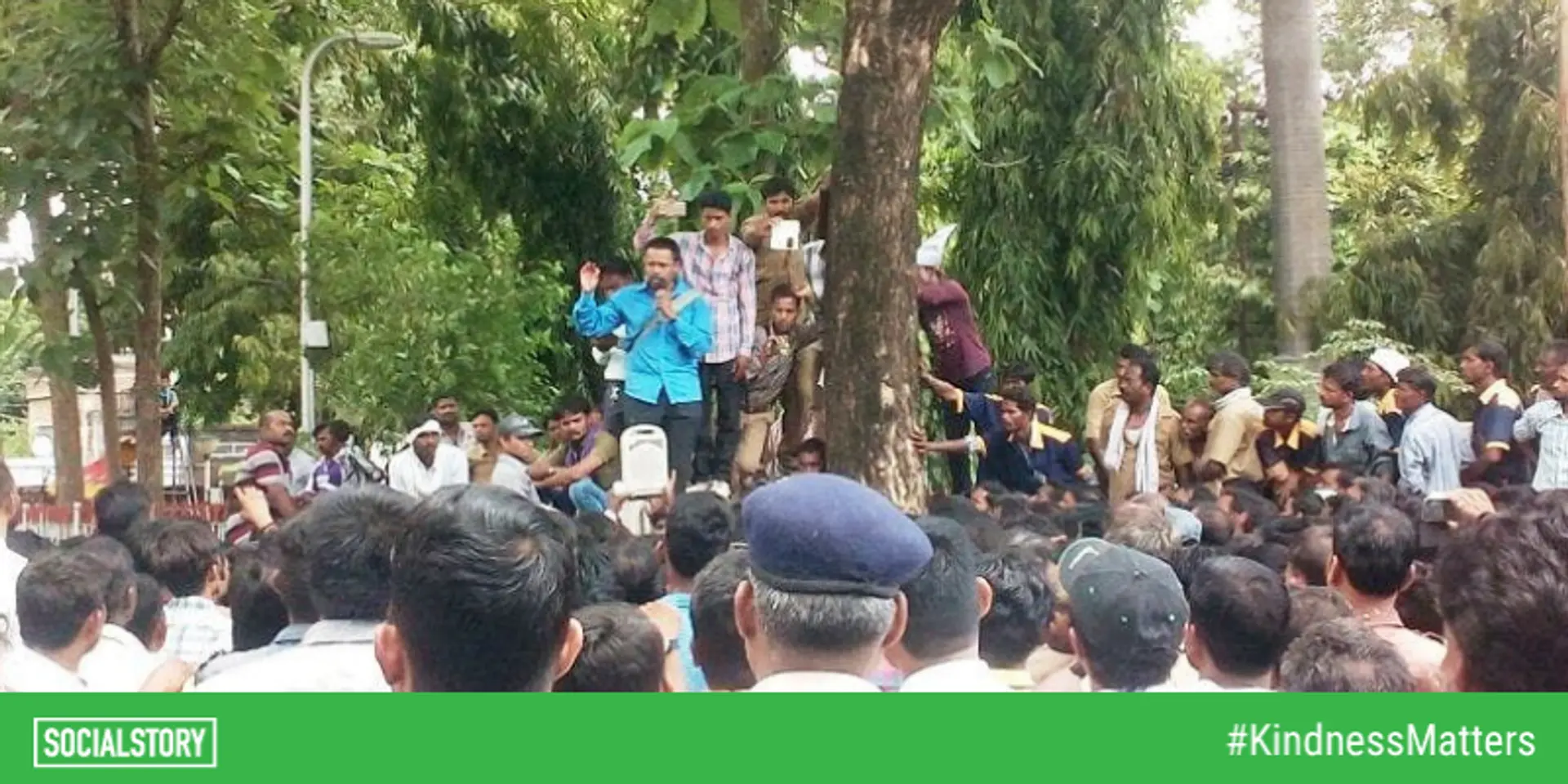A 29-year-old’s battle to secure living wages for contract workers in Maharashtra
Siddharth's work has benefited over 9,000 unorganised contract labourers including waste management workers, computer operators, drivers, mechanics, and security guards.

Siddharth Prabhune’s (29) has been an unusual journey. Showing great courage and proclivity for hard work, he chose a life of activism right after he stepped out of university. There has been no looking back for him ever since, as he engaged with unorganised contract labourers across different cities of Maharashtra, making them aware of their rights and leading a battle against oppressive labor practices.
Early influences
Born in a well-educated middle class family in Pune, Siddharth was always socially conscious. His parents were supportive of the decisions he made and never pushed him to take up a formal career to earn a living. He chose to pursue a degree in Urban and Rural Community Development from Pune University, which would then set him off on his unique career path.
“In the final year of my graduation, I watched a documentary called The Garbage Trap, filmed by the Pune Mahanagarpalika Kamgar Union. The documentary jolted me while sensitising me about the grim prevailing situation of sanitation workers.”
He was also greatly inspired by Mukta Manohar, the then General Secretary of Pune Mahanagarpalika Kamgar Union. She has been his mentor and has constantly guided him in his work.
The journey
Siddharth started work as a full time activist in 2013 with the Pune Mahanagarpalika Kamgar Union. He worked there for two years with contract labourers in the solid waste management sector to secure their minimum wages, bonus, ESI, PF etc. In December 2015, he shifted to Nagpur. He has been working independently ever since for over 9,000 unorganised contract labourers like waste management workers, computer operators, drivers, mechanics, security guards, etc. employed by the Nagpur Municipal Corporation.
“They work in primitive working conditions, without protective measures like hand gloves, masks, gum boots etc. Their salary is less than half the prescribed minimum wages. They are unaware of their basic rights as employees. As the existing labour unions work only for permanent labourers, these contract workers are mostly unorganised. So I decided to become the voice for these workers.”
His most notable work has been the securing of minimum wages for workers in the Nagpur Municipal Corporation (NMC), as per the revised rules of 2015. He started by gathering information through the filing of RTIs, six in this case.
It was followed up with letters and applications to the Corporation to bring the issue to their notice. He regularly met with officials and corporators to prod them into action. Most importantly, he addressed small gatherings of workers to educate them about their rights, thus arming them to fight their own battle. At one occasion, he also led a march of about 2,000 such workers to the commissioner’s office.
On this difficult journey Pravin Mote, a senior activist from Nagpur Center for people’s social forum organisation members and corporator Prafulla Gudadhe provided him with unconditional moral support. Consequently, in May 2016, after five months of painstaking efforts and rigorous follow-ups, the commissioner gave a written order to implement minimum wages in the Nagpur Municipal Corporation. This was a huge victory and Siddharth recollects it fondly.

What makes him tick?
The positive impact he has had on the lives of the people of this marginalised community and the visible betterment in their living condition keeps him inspired and focused.
About 6000 rag pickers and sanitation workers in NMC, and 1000 other workers including computer operators, drivers, security guards, etc. have received a salary hike from Rs 7,500 to Rs 14,500 per month after the implementation of the government resolution (GR). The benefit has been extended to 2000 contract workers in Nagpur Improvement Trust (NIT) from November 2016 onwards. His work has also secured protective gear like mask, gumboots and hand gloves to over 1500 labourers.
“The standard of living of these labourers has improved considerably. Now they are financially more stable. Their lifestyle has improved. It is evident by the fact that they now can afford to purchase two wheelers, mobiles phones, televisions, and other appliances.”
He has compiled a booklet named “Kiman Vetan Hakkache” containing information on the laws governing minimum wages. The booklet was published by two different organisations and over 2000 copies of this booklet were distributed among laborers, free of cost.
The long road ahead
Siddharth does not want to rest on his laurels. He has his sights set on larger goals. He wants to help workers in other districts of Vidarbha, including Amravati, Chandrapur and Bhandara. However, lack of financial and institutional backing have made progress slow.
“In Maharashtra alone there are more than 5 lakh contract workers in 353 local self-government bodies which include 26-municipal corporations and mahanagarpalikas, 220-nagarparishads and 107- nagarpanchayati. Only Nashik and Mumbai municipal corporations have implemented the revised wages, and now Nagpur. Five lakh labourers in Maharashtra are still unaware of the revised wages and its implementation. Their struggle is still on.”
“I am trying to file a case in the Maharashtra High Court for stricter implementation of minimum wage laws. I also wish to study the condition of labourers in a scientific manner. Currently, I am in search of research grants to put these plans into action.”
(This story is part of the #KindnessMatters series, a partnership between YourStory and UNESCO MGIEP)



